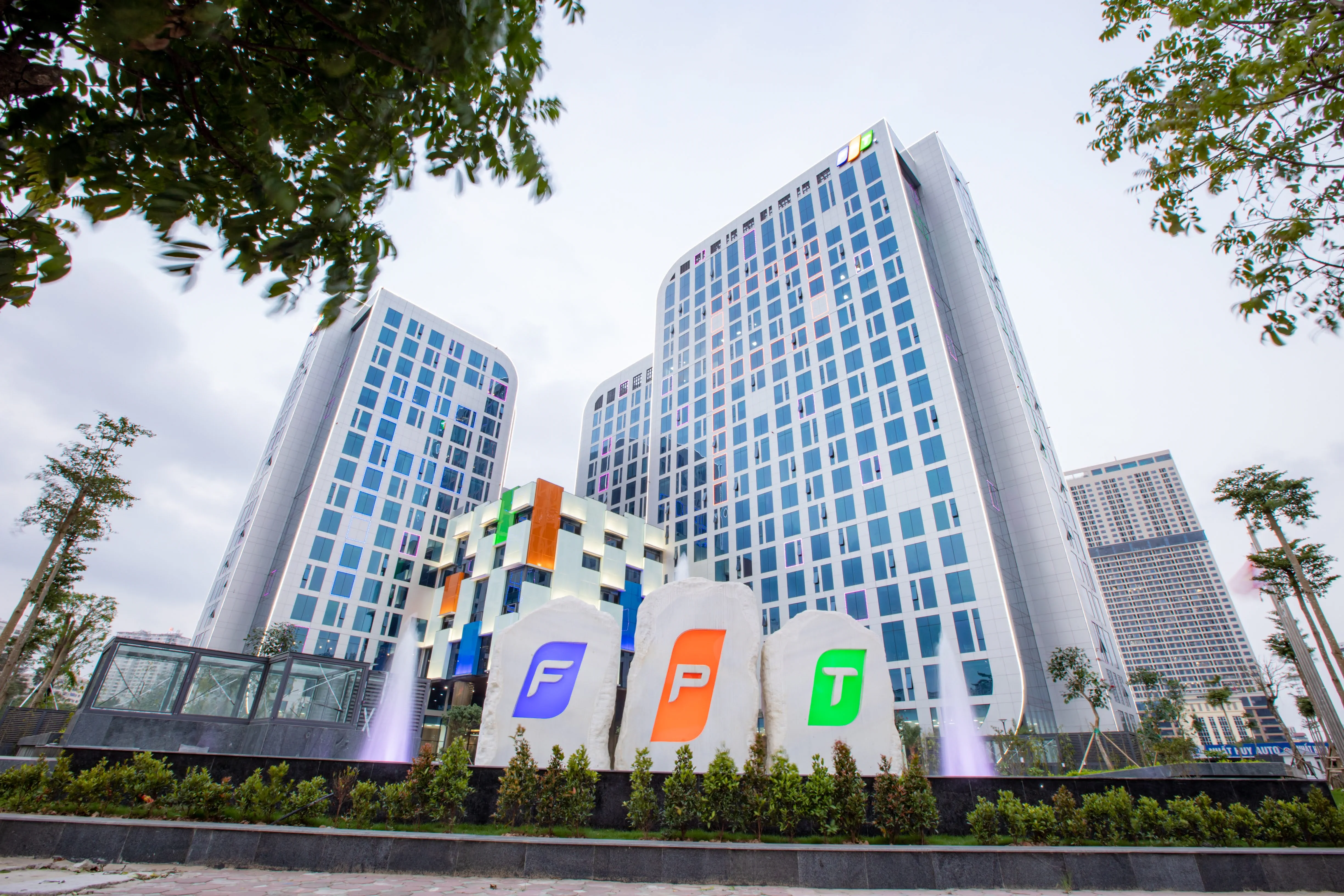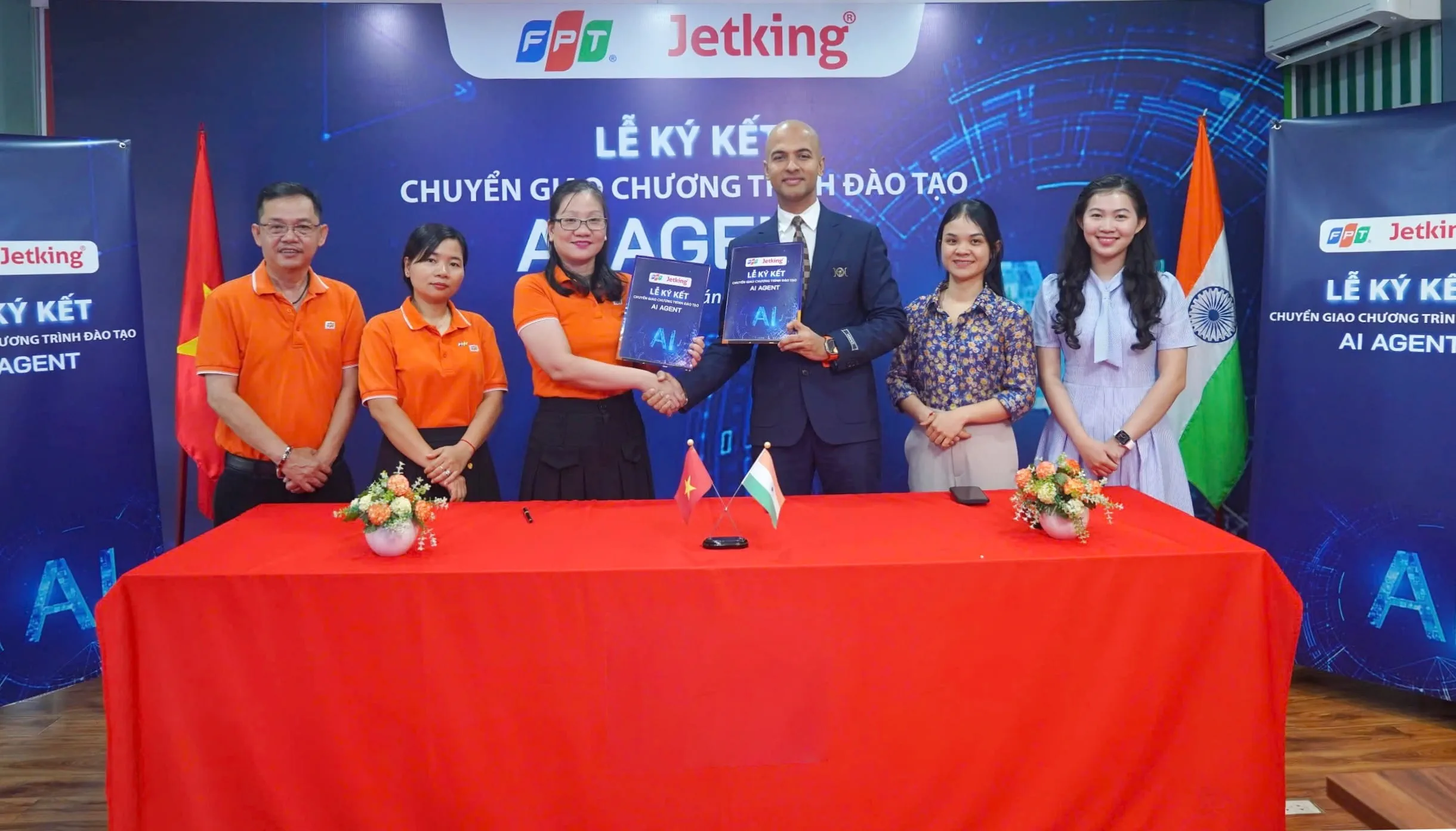Latest green transformation strategies for Vietnamese businesses
•
23/08/2024
FPT IS teamed up with EuroCham to host the conference titled "From ESG Framework to Decarbonisation Plan." At the event, experts shared insights on the current landscape, practical experiences, and tech solutions to help Vietnamese businesses speed up their green transformation. They focused on optimizing production processes and rolling out emission reduction strategies, all in line with international ESG standards and the Net Zero goal.
The conference drew over 50 top business leaders from Vietnam's transportation and manufacturing sectors, all eager to engage with leading experts in the field of ESG. Kicking off the event, Mr. Torben Minko, Vice President of the European Chamber of Commerce in Vietnam (EuroCham), stated, "Achieving Vietnam's Net Zero goal by 2050 requires more than just national efforts; it demands active contributions from every industry and business. This includes proactively improving production processes and implementing emission reduction solutions. Recognizing this need, EuroCham has partnered with FPT IS to organize this workshop, offering a comprehensive overview of the current landscape and a collaborative approach to crafting a clear emissions reduction roadmap and achieving our targets through an integrated strategy."
Embracing green transformation: A sustainable business strategy
Addressing the broader context and international regulations on emission reductions, Mr. Dennis Quennet, Director of Sustainable Economic Development at GIZ Vietnam, noted, "The European Parliament has committed to a 55% reduction in greenhouse gas emissions by 2030 and aims to achieve carbon neutrality by 2050. This commitment will have a direct impact on European businesses and those connected to the European market, necessitating a mandatory shift in how companies operate and report ESG compliance starting in 2025 or 2026. As a result, businesses, including those in Vietnam due to their supply chain links, will need to familiarize themselves with ESG requirements."
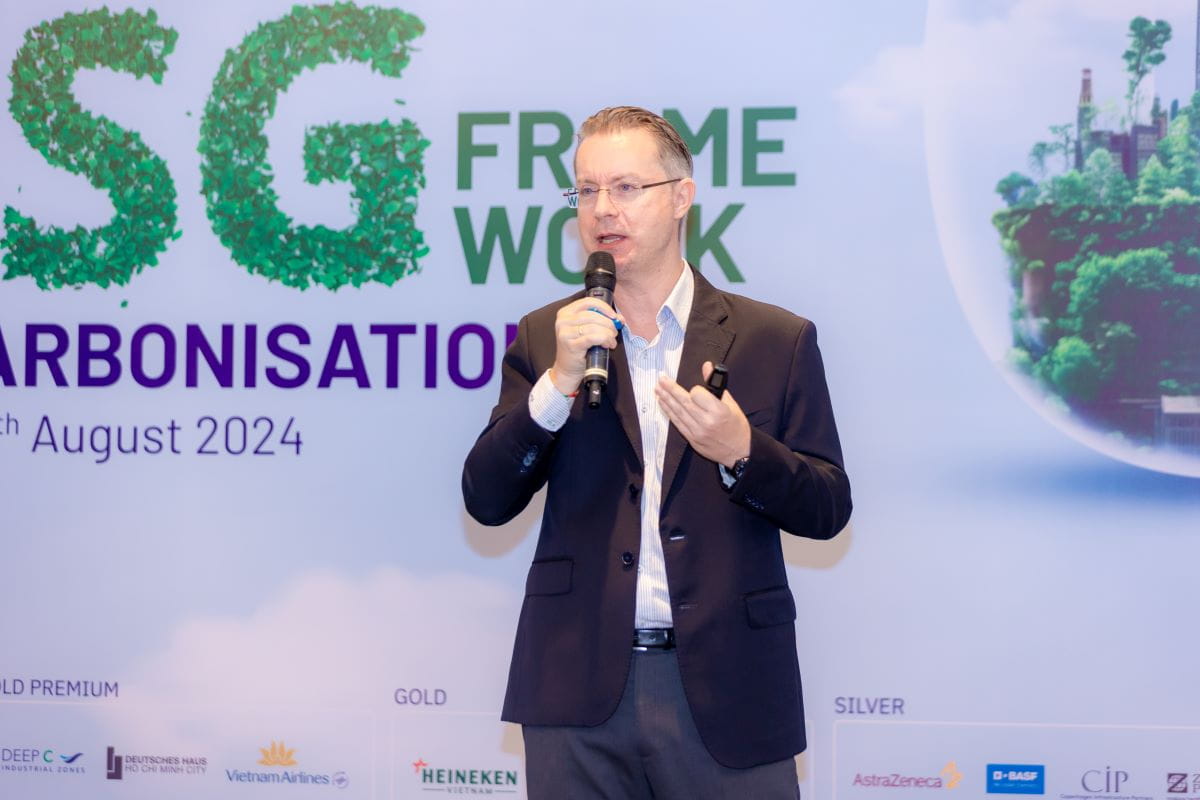
Mr. Dennis Quennet, Director of Sustainable Economic Development at GIZ Vietnam, presented at the conference
Mr. Dennis Quennet also highlighted the benefits businesses can reap, emphasizing that this is a prime opportunity to achieve a breakthrough: "In the medium and long term, investing in ESG initiatives offers significant advantages, especially for those who act early. Beyond being prepared to meet green transformation regulations, early adopters gain a competitive edge through enhanced transparency and reputation, better risk management, and the potential to reduce production costs over time."
In Vietnam, the government has also issued strategic guidelines, action plans, and programs at both the national and sectoral levels, aligning with international commitments on sustainable development from 2017 to the present. Mr. Nguyen Viet Long, Global Consulting Services Partner at Ernst & Young Vietnam (EY Vietnam), a firm with over 20 years of experience in sustainable development consulting for government ministries such as the Ministry of Transport, Ministry of Planning and Investment, Ministry of Agriculture..., emphasized the importance of mechanisms, policies, and targeted support programs from state management agencies. He highlighted that these are crucial in encouraging businesses to adopt green and sustainable production models. Additionally, he noted that digital transformation is expected to play a critical role in driving the green transition, helping to achieve green growth and sustainable development goals at both the national and enterprise levels.
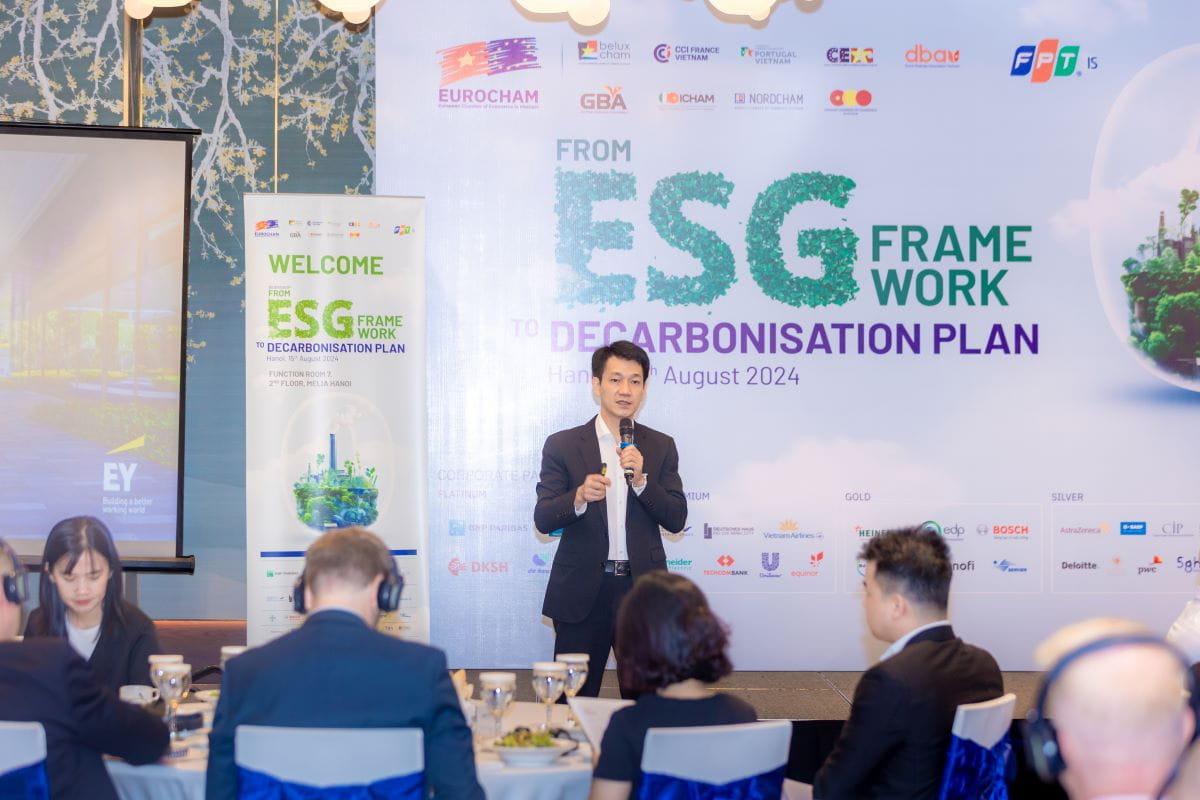
Mr. Nguyen Viet Long, Global Consulting Services Partner at Ernst & Young Vietnam (EY Vietnam), shared information about green transformation requirements.
At the conference, in light of the pressing need for businesses to "transform" toward green practices, Mr. Than Minh Ngoc, Executive Vice President & Deputy Director of the Enterprise Division at FPT IS, highlighted three significant challenges Vietnamese companies face in their sustainability efforts. These challenges were identified in the report "Readiness and Difficulties of Businesses in Green Transformation," conducted by the Private Economic Development Research Board (Board IV) at the end of July.
Firstly, when it comes to budget, businesses are grappling with balancing the investment costs for green transformation against their profitability. Secondly, regarding human resources, nearly 46.8% of companies in Vietnam need more personnel with expertise in emission reduction and green transformation, while regulations and standards are rapidly evolving. Thirdly, regarding solutions and tools, 44.2% of businesses are struggling to find suitable technology solutions. Many are still using manual measurement processes, which can lead to errors, fraud, and lack of transparency in data.
Technology bridges the gap between benefits and costs, paving the way for effective emission-reduction practices
To address these issues, Mr. Pham Tuan, Co-founder of VertZéro at FPT IS, emphasized that businesses need to tackle several fundamental questions: What is the current status of emission reduction within the company? What are the plans and goals with specific timelines for the future? How will the financial impact of various emission reduction scenarios influence investment decisions? And finally, what is the best approach for collaborating with suppliers to effectively reduce emissions?
Mr. Tuan analyzed the fact that technology and data are crucial for solving these issues. He pointed out that many businesses currently use Excel files for calculating and tracking emissions, which can lead to errors and fraud. Without proper monitoring and supervision, emission reduction efforts risk becoming "Greenwashing," where businesses make misleading claims about their green practices without genuinely implementing them. To address this, Mr. Tuan introduced the SBTi and MACC standard ESG implementation methods as effective solutions.
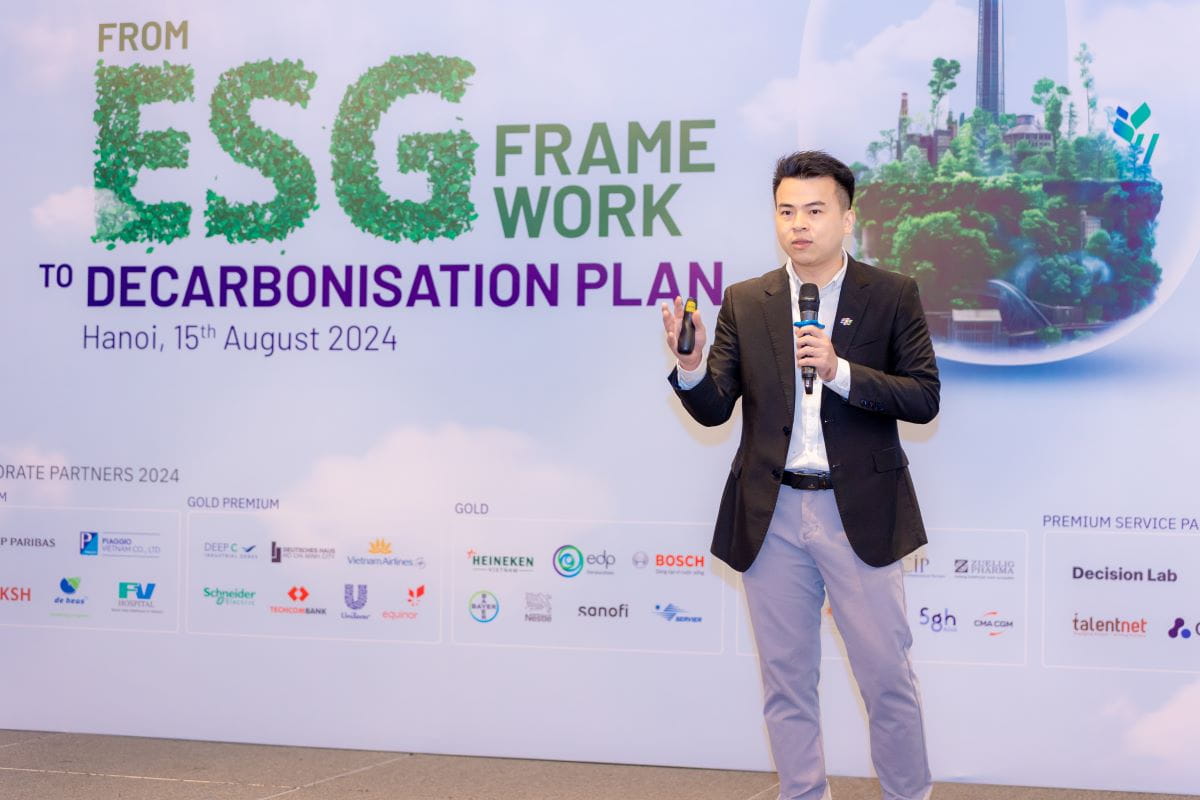
Mr. Pham Tuan, Co-founder of VertZéro solution at FPT IS, shares key initiatives to help businesses implement green transformation.
The Science Based Targets Initiative (SBTi) is a global effort led by the UN Global Compact, World Resources Institute (WRI), and Carbon Disclosure Project (CDP). It offers science-based targets for emissions reduction, which businesses and organizations can adopt. These targets have become crucial to annual reports and institutional investor evaluations through CDP questionnaires and scoring. With over 20,000 companies worldwide using SBTi, it helps align current business practices with Net Zero goals and adapt emission standards to fit different industries and regions.
Alongside, the MACC (Marginal Abatement Cost Curve) is an economic analysis tool designed to identify measures for reducing greenhouse gas emissions at the lowest cost. This model, widely used by the World Bank and others, helps pinpoint the most cost-effective strategies for emission reductions. Recognizing the value of MACC, Mr. Tuan mentioned that FPT IS developed the VertZéro solution—the first greenhouse gas inventory tool in Vietnam utilizing MACC principles.
VertZéro helps businesses define boundaries and measure emissions across three ranges, offering multidimensional emissions disaggregation and access to global emissions factors. This enables companies to set accurate emission reduction goals and track emissions effectively. The solution ensures transparency by generating greenhouse gas inventory reports that comply with regulations such as Decree 06/2022/ND-CP, ISO 14064, GHG Protocol, and IPCC standards. VertZéro automates the entire greenhouse gas inventory process, including regulatory compliance, updating emission factors, connecting data from suppliers, and automating report creation.
At the end of the conference, business leaders showed strong interest and posed various questions about roadmaps, methods, and technologies for supporting green transformation. They focused mainly on sectors like petrochemicals, iron and steel, and transportation, where green practices are urgently needed in Vietnam.
With the support and commitment from FPT IS, EuroCham, EY Vietnam, and GIZ Vietnam, the goal is to help Vietnamese businesses swiftly progress toward achieving Net Zero, drive significant business advancements, and contribute to sustainable development on both national and global scales.


